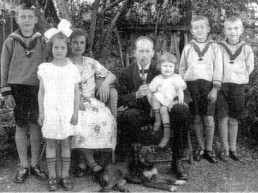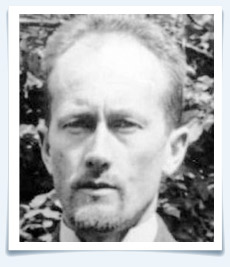Karl Friedrich Stellbrink
Portrait
Pastor Karl Friedrich Stellbrink’s career is not without controversy. He, who was sentenced and executed as an opponent of the Nazi Regime, came to Lübeck as a supporter of that regime in 1934. Stellbrink supported the program of the NSDAP (National-Socialist German Labour Party) from a German-national point of view and had welcomed Adolf Hitler’s ascension to power with great hopes. Contributing to his expectations would have been the romanticised picture of Germany which Stellbrink would have carried with him during his time of service as pastor to German parishes in Brazil (1921 to 1929).
 Stellbrink, like many others, fell victim to the deceptions of Hitler, who pretended to be a Christian and liked to quote biblical texts. As time proceeded, Stellbrink’s idea of a fruitful symbiosis between Christendom and National-socialism proved to be nothing but an illusion. A crucifix covered up with a greatcoat at the chapel of the VorwerkCemetery during the funeral of a Lübeck Nazi personality was to him the beacon of Christ-hatred, a hatred which he openly denounced in his sermon on Palmarum (Palm Sunday) 1942, after the terrible bombing raid on Lübeck: “God has spoken in a loud voice and the people of Lübeck will once again learn to pray”. This sermon led to his arrest by the Secret State Police (Gestapo), which was followed by the arrest of the three catholic priests. Also arrested and charged were 17 members of the catholic community and an evangelical-Lutheran parishioner. They were tried and sentenced to various lengths of imprisonment, except for two cases, which were deemed to have served their time in remand.
Stellbrink, like many others, fell victim to the deceptions of Hitler, who pretended to be a Christian and liked to quote biblical texts. As time proceeded, Stellbrink’s idea of a fruitful symbiosis between Christendom and National-socialism proved to be nothing but an illusion. A crucifix covered up with a greatcoat at the chapel of the VorwerkCemetery during the funeral of a Lübeck Nazi personality was to him the beacon of Christ-hatred, a hatred which he openly denounced in his sermon on Palmarum (Palm Sunday) 1942, after the terrible bombing raid on Lübeck: “God has spoken in a loud voice and the people of Lübeck will once again learn to pray”. This sermon led to his arrest by the Secret State Police (Gestapo), which was followed by the arrest of the three catholic priests. Also arrested and charged were 17 members of the catholic community and an evangelical-Lutheran parishioner. They were tried and sentenced to various lengths of imprisonment, except for two cases, which were deemed to have served their time in remand.
Realising the true character of National-socialism was paralleled with Stellbrink’s growing friendship with the three catholic chaplains and the von de Berg family, who played a leading role in the catholic community in Lübeck. While Stellbrink’s initial anti-catholicism had been implanted during his education, it turned into acceptance. This friendship also led to the appreciation of the importance and implications of the sermons of the bishop of Münster, Graf von Galen, which revealed irrefutably the criminal and inhuman character of the Nazi regime. It resulted in their copying and duplicating these sermons together, which were distributed among the community. This was the true reason for their arrests, trials and executions.
Stellbrink stood, like many other evangelical theologians before 1933, for a tradition which had an anti-catholic, anti-jewish character. „Against Rome and Juda!“ became their motto, because both were deemed to be un-German and alien to the German psyche. As his anti-catholic stance withered so did his anti-jewish attitudes.
Pastor Karl Friedrich Stellbrink thus took a long route, which changed from a German-national and National-socialist conviction, his rejection of catholicism and judaism, to their acceptance and a furtherance in the latter phase of his life; yet it ultimately led to his conviction.
Original GermanText: Ökumenischer Arbeitskreis „Lübecker Märtyrer“
English Translation: Hans-Heinrich Boeker, Wyoming, Australia
proceed to portrait of Johannes Prassek










